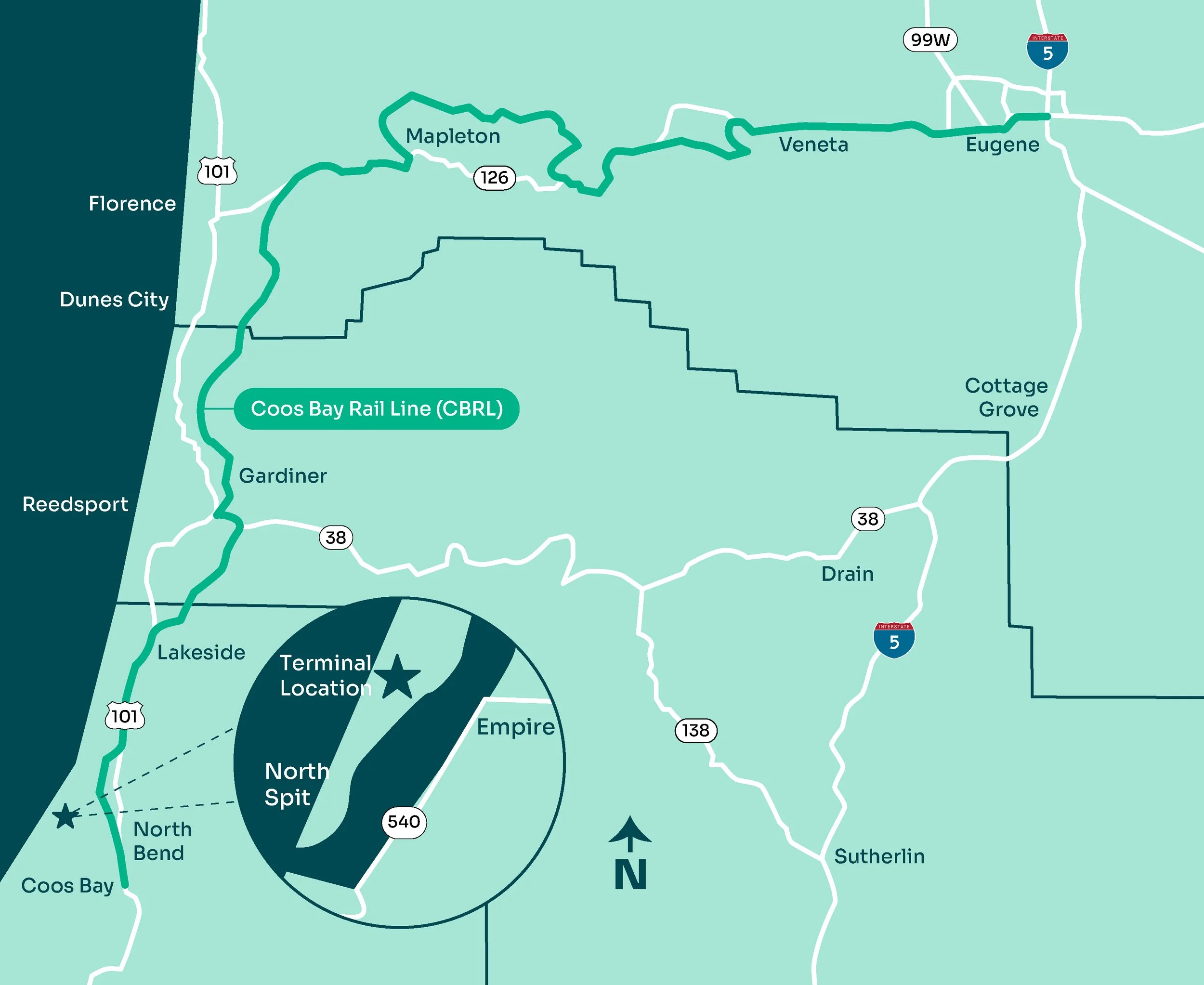
About the Pacific Coast Intermodal Port
A new trade connection
The Oregon International Port of Coos Bay is planning the Pacific Coast Intermodal Port (PCIP)—a new terminal for container ships—on the North Spit of Coos Bay.
The new container shipping facility would occupy 175 acres on the North Spit peninsula, directly west of North Bend on land owned by the Oregon International Port of Coos Bay. The facility would be located on the inland side of the peninsula, and ships would access it by traveling into Coos Bay Harbor and 6 miles up the channel.
The Pacific Coast Intermodal Port would operate differently from most. Instead of using trucks, nearly all freight would move directly from ships to trains, streamlining shipping operations. In addition, the new port facilities would be powered by electricity. Ships would be able to plug into the dockside electricity, reducing their reliance on diesel at the dock.
The project would include upgrades to the Coos Bay Rail Line in Coos, Douglas and Lane counties to allow for direct transfer of cargo from ships to trains. These upgrades would allow increased train travel from Coos Bay to Eugene, linking international shipping routes with inland markets and reducing the need for truck freight.
The plans also call for deepening and widening the Coos Bay Federal Navigation Channel to allow large container ships to safely pass through it. The planned upgrades would also increase the margin of safety for ships of all sizes that use the channel.
Through a public-private partnership, the PCIP project is led by the Oregon International Port of Coos Bay, which owns and operates the area’s existing port and rail line, and NorthPoint Development, a real estate firm based in Kansas City, Missouri, which would develop and operate the new terminal.
The map above shows the project area and the Coos Bay Rail Line (CBRL)
Cost & funding
The total project cost estimate (including planning, design and construction of the new container shipping terminal, as well as the channel deepening and rail improvements) is currently $2.3 billion. This estimate will likely change in the coming years as plans evolve and more information becomes available.
The project team has been hard at work identifying funding and has secured more than $100 million in state and federal funding to support the design and pre-planning phase. The team is seeking more funding for final design and construction.
Funding awarded:
$160 million committed by the Oregon State Legislature (2006, 2023, 2025)
$25 million awarded by the federal Infrastructure for Rebuilding America (INFRA) Grant Program for design and other pre-construction work (2024)
$29 million awarded by the federal Consolidated Rail Infrastructure and Safety Improvements (CRISI) Program for rail upgrades (2024)
Funding requests and applications in progress
(amounts to be determined):
U.S. DOT’s Railroad Rehabilitation and Improvement Financing (RRIF) loan, for Coos Bay Rail Line (CBRL) improvements
Channel modification funding (source to be determined)
Project background
Ports play a vital role in the state and national economy by acting as an economic engine to create new jobs, foster new trade opportunities and facilitate investments that benefit local communities and the broader state economy.
Under ORS 777.065, Oregon lawmakers identified the development of an international port in Coos Bay, among other port cities, as a high-priority state economic goal. Lawmakers cited the ability of international trade to diversify and strengthen Oregon’s economy.
The Oregon International Port of Coos Bay has served as a critical hub for Oregon's maritime industry for over 100 years. In the decades prior to the 1980s, the Port handled significant shipping activity, largely driven by timber exports. However, with the decline of the timber industry, the region experienced economic challenges.
The Port has continuously worked to adapt and overcome economic challenges. In recent years, the port has expanded its transportation portfolio with the acquisition of the Coos Bay Rail Line. The Pacific Coast Intermodal Port (PCIP) project is part of the Port's broader effort to modernize and diversify Coos Bay's regional economy.


